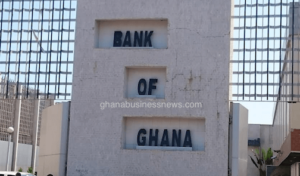Bank of Ghana maintains policy rate at 19%
 The Monetary Policy Committee of the Bank of Ghana has maintained its policy rate at 19 per cent, citing deceleration in the rate of inflation and concerns for growth.
The Monetary Policy Committee of the Bank of Ghana has maintained its policy rate at 19 per cent, citing deceleration in the rate of inflation and concerns for growth.
Dr Ernest Addison, the Governor of the Bank of Ghana, told a press conference that the Committee decided to halt the rate hikes and observe the impact of the recent monetary policy measures.
The committee noted that inflation has persisted on an elevated path. A detailed review of the consumer basket shows that although initially driven by supply side shocks, the initial relative price changes have broadened to almost all the items in the consumer basket.
The committee also noted the deceleration in the rate of inflation in the last reading.
“Based on the above assessment the committee was of the view that it will be appropriate to pause and observe the impact of the recent monetary policy measures already taken. The committee therefore decided to maintain the policy rate at 19 per cent,” he said.
The Bank of Ghana has responded decisively with policy tools over the last few months, increasing the policy rate by accumulative 550 basis points since November 2021 and tightened liquidity to tame inflation.
Dr Addison said the committee expected the macro economic framework that will underpin an agreed IMF supported programme would present a strong coordinated monetary and fiscal policy framework that would anchor stability and prevent a wage price spiral which will lead to inflation becoming more entrenched.
He said the execution of the budget had been challenging against the backdrop of macroeconomic developments for the first five months of the year.
Available Data shows a higher deficit relative to programmed, driven mainly by significant shortfalls in revenues relative to projections.
The revenue underperformance reflected delayed implementation of several new revenue measures announced in the budget, he said.
On the expenditure side, higher interest payments led to some pressures despite restraint on primary expenditures, especially on capital expenditures, which has declined markedly.
He said financing of the budget was entirely met from domestic sources during the first half of the year as planned borrowing from international sources did not materialise.
“The outlook is for continued tightened borrowing conditions, and this underscores the need to reprioritize spending programmes within the available financing envelopes,” he said.
On July 1 2022, the government announced its intention to seek support from the International Monetary Fund.
Initial talks have begun and it is envisaged that a fund supported programme will help anchor expectations through implementation of reforms to restore credit worthiness and eventually lead to regain of access to the international capital markets.
Dr Addison said the markets had already started internalising the positive effects of the engagement with the IMF.
Source: GNA
